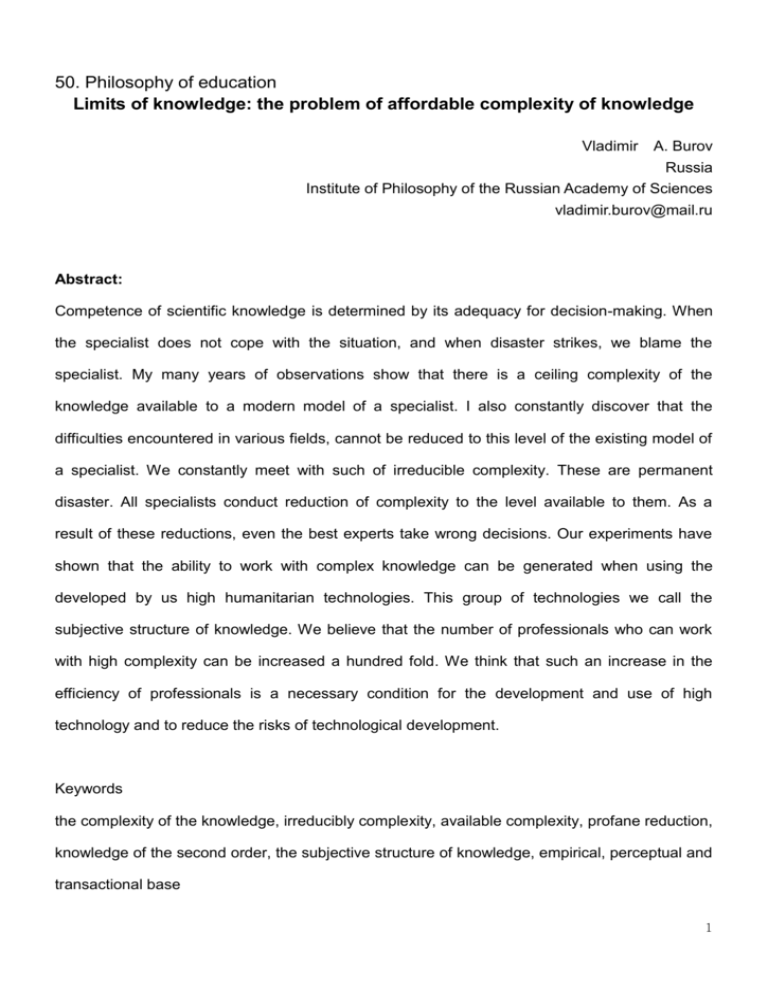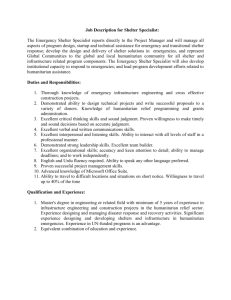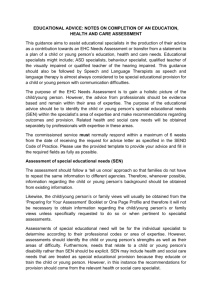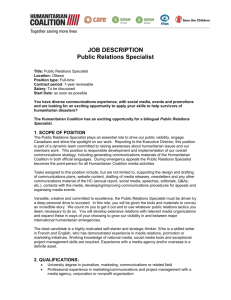The Title of the Abstract Should be centered over the Main Body
advertisement

50. Philosophy of education Limits of knowledge: the problem of affordable complexity of knowledge Vladimir A. Burov Russia Institute of Philosophy of the Russian Academy of Sciences vladimir.burov@mail.ru Abstract: Competence of scientific knowledge is determined by its adequacy for decision-making. When the specialist does not cope with the situation, and when disaster strikes, we blame the specialist. My many years of observations show that there is a ceiling complexity of the knowledge available to a modern model of a specialist. I also constantly discover that the difficulties encountered in various fields, cannot be reduced to this level of the existing model of a specialist. We constantly meet with such of irreducible complexity. These are permanent disaster. All specialists conduct reduction of complexity to the level available to them. As a result of these reductions, even the best experts take wrong decisions. Our experiments have shown that the ability to work with complex knowledge can be generated when using the developed by us high humanitarian technologies. This group of technologies we call the subjective structure of knowledge. We believe that the number of professionals who can work with high complexity can be increased a hundred fold. We think that such an increase in the efficiency of professionals is a necessary condition for the development and use of high technology and to reduce the risks of technological development. Keywords the complexity of the knowledge, irreducibly complexity, available complexity, profane reduction, knowledge of the second order, the subjective structure of knowledge, empirical, perceptual and transactional base 1 Papers Limits of knowledge: the problem of affordable complexity of knowledge Vladimir A. Burov Russia Institute of Philosophy of the Russian Academy of Sciences vladimir.burov@mail.ru We have studied the problem of formation of the knowledge economy. We have linked this issue with the problem of the abilities of an expert to work with complex knowledge. This ability we have identified as a component of human capital, without which there is no transition to a new technological system of the 21st century. We have identified the technologies of knowledge management as the basis of scientific knowledge. This was the development of humanitarian (human-dimensional) technological bases of postnon-classical science (project of the Institute of philosophy, RAS "Philosophy of governance in the world of complexity") and the beginning of the formation of a new sector of high-tech humanitarian production - preparation of specialists, which greatly exceed the present day model on its efficiency. Competence of scientific knowledge is determined by its adequacy for decision-making. When the specialist does not cope with the situation, and when disaster strikes, we blame the specialist. My many years of observations show that there is a ceiling complexity of the knowledge available to a modern model of a specialist. I also constantly discover that the difficulties encountered in various fields, cannot be reduced to this level of the existing model of a specialist. We constantly meet with such of irreducible complexity. All specialists conduct reduction of complexity to the level available to them. However, even the best of them do not use the expertise and knowledge of specific technologies to enhance the available complexity. 2 Ability to work with the complexity they consider innate. As a result of these reductions, even the best experts take wrong decisions. These are permanent disaster because of the incompetence of the existing model of a specialist. We attempted to evaluate the distribution of specialists on the characterization of the available complexity of knowledge. For this we used the statistics of single state exam for secondary school graduates. Here each year there are about two and a half million deployed measurements. These measurements show that only one out of five hundred school graduates can perform tasks of high complexity. There is a system of elite higher education, which focuses on the selection of these outstanding students. The rest study at the accessible them a lower level of complexity of the knowledge. The end result is 0.2% of the specialists, able to work with complex knowledge. Further, these 0.2% of leave in the United States or Europe or lost in the incompetent communities. Results of our experiments have shown that the ability to work with complex knowledge can be generated when using the developed by us high humanitarian technologies. This group of technologies we call the subjective structure of knowledge. We believe that the number of professionals who can work with high complexity can be increased a hundred fold. We think that such an increase in the efficiency of professionals is a necessary condition for the development and use of high technology and to reduce the risks of technological development. We offer a wide international project of development of a new generation of high humanitarian technologies of work with complex knowledge. My research on robotics and engineering I started in 1975. While on a business trip at the factory, where it was created the first in the USSR industrial robot, I found the lack of theoretical models of mechanics (mechanical engineering research Institute of the Academy of Sciences of the USSR) and the information management theory (Institute of problems of management of the Academy of Sciences of the USSR) for the description of the selected me phenomena of 3 robotics. In these experiments, the accuracy of operation of the robot exceeded a theoretical possibility. This opened up completely new opportunities of the development of robotics. I reported on these observations, the Director of the Institute of mechanical engineering of the Academy of Sciences of the USSR. He appreciated these initial results as the beginning of a future discoveries. I started to analyze the mathematical foundations of mechanics of machines and information management theory. Here I first discovered that even the greatest scientists are not able to work at once with several modern mathematical theories. All they restricted the complexity of their designs, which led to erroneous constructions and conclusions. In the robotics this led to a complete shutdown of the most important features of the development of this class of machines. Unfortunately, my research were outside the accessible my colleagues complexity, met misunderstanding and even resistance. These works were unclaimed. Following this experience, I was working with a new computer complex, which was created in the Institute of problems of management of the Academy of Sciences of the USSR. Expected me opportunities of this complex were destroyed by software developers. Here again the group is very strong professionals could not work at the appropriate level of complexity. This is now limited the possibilities for the development of new architectures of computer technology. The collapse of the USSR showed that such a situation braking of development of high technologies are taking place in all branches of science and practice. All of these experiences have taught me that scientific knowledge is closely associated with its internal organization of a human. The factor that limits the complexity of the available knowledge, is a well-established (in the science and practice) norm profane control the complexity of knowledge (profane reduction) - without the use of knowledge about knowledge and special humanitarian and social technologies (such technology today is not requested, has not been funded and are not developed). Limitations of available difficulties lead to the fact that the person psychologically protected from overloads of the psyche of complexity. Man is 4 encapsulated in the reduced-form models of knowledge, familiar and available to him. Even in case of serious threats (Chernobyl, the collapse of the USSR, executing the laws of the Russian Federation), even a very good specialist takes decisions available to him in the complexity of the models, ignoring the difficult knowledge known to him the other facts that contradict the reference model. My further studies were aimed at the study of this structure and its influence on the effectiveness of the work of the specialist. From Mathematics and Mechanics of machines I switched to psychology, sociology, and philosophy. My position corresponds to the understanding of scientific knowledge, which was formed at the Institute of Philosophy of the Russian Academy of Sciences. In this model, we have to consider the human dimension of science. To view this new dimension, we used the results of philosophy, sociology, psychology, neurobiology, and other branches of science. We have begun to develop models of different branches of science, including in the human dimension of these models: the mathematics of the second order, second-order computer science, mechanical machines of the second order, psychology, education, law and others. These models include a special knowledge about knowledge, which we call the knowledge of the second order. They also include special kinds of experience: an empirical base, perceptual base, transactional base. Many moments of pedagogical experience are beyond the boundaries of the empirical base of scientific pedagogy. They are mysterious component of the pedagogical skill. They do not become technologies. For the disclosure of hidden and creation of technologies it is necessary to refer to the latest results of science and philosophy. These new results provide the interface required to work with this experience. Here is required for such research basis of perception. This includes the base of special transactions. This is a very sophisticated knowledge. This knowledge combines many scientific disciplines. Such knowledge is present in many modalities: formal academic, personal, connected with the 5 peculiarities of feeling, communication, self-awareness of man defined goals and values of man and society. Everyone understands that his knowledge is built on a certain experience, formed in his special sensitivity and special means of communicating with others and with ourselves. However, this component of scientific knowledge will be given for the brackets of scientific knowledge as not included in this knowledge. We bring back this component in the system of scientific knowledge, as its inseparable part. Scientific knowledge is considered by us as a communicative phenomenon. We determine that one of the important factors of knowledge management is the activity of the brain. Effective transfer of knowledge cannot be separated from the transfer of the relevant forms of brain activity. Working with A.-V.Burov, we have identified the phenomenon of direct transmission pattern of brain activity in the communication - resonance patterns of brain activity. We used this phenomenon to prepare for the unified state exam and university entrance. This phenomenon we define as the neurobiological resonance. We associate it with the work of mirror neurons. The obtained with A.-V.Burov results and some other experiments have shown us that a person's ability to work with complexity can be repeatedly improved through the use of high humanitarian technologies. These experiments show that effective knowledge can only be acquired through direct contact with the person in possession of such knowledge. Books and the Internet only complement this communication. We introduced the concept of trans-modal knowledge economy: explores the resources of production of the vital worlds of man and society (carried out in a multitude of social, economic, cultural, spiritual, psychological, legal, educational, etc. modalities of individual and social being); defines the complexity of as a factor, on which depends the efficiency of the economy; highlights the complexity of the trans-modal structure of knowledge; defines thresholds complexity of the development of such production; 6 detects and generates a group of technologies of trans-modal crossing of such thresholds; considers the issues of modern convergent technologies development, where the high humanitarian technologies of knowledge management play the role of the elevator through such thresholds. High technologies of production could not be separated from the high humanitarian technologies of education and science. Only together they form a modern trans-modal production. A considerable lag of technologies of education and science lead to a disastrous mismatch of the abilities of the expert and the complexity of the production. Education does not produce the necessary number of specialists able to solve complex tasks. In this complex high technology begin to determine the modern production. A significant part of the world production is not provided by the specialists of the required level. This creates a permanent risk of technogenic accidents. The proposed transition from screening gifted students to their mass production is a necessary condition of a competent development of production and reduction of the global risk of contemporary anthropogenic development. Only by common efforts we will be able to cope with the total incompetence and inability of the best contemporary specialists to work with the complex trans-modal and trans-disciplinary knowledge. В.А.Буров, in Синергетическая парадигма (Прогресс-Традиция, Москва, 2011). pp.408- 426. А.-В.В.Бурова, in Психология индивидуальности: материалы IV Всероссийской научной конференции, Москва, 22–24 ноября 2012 г. (Логос, Москва, 2012), p.85. 7








